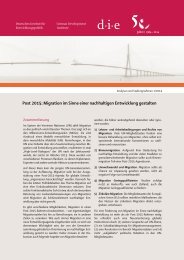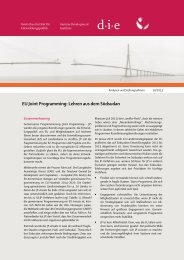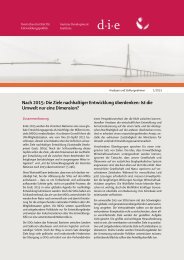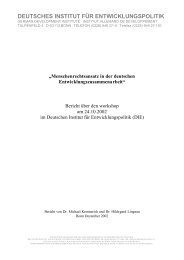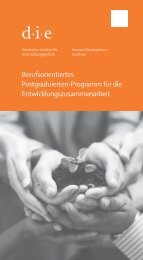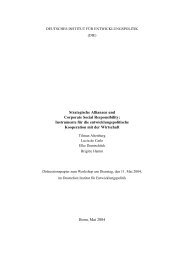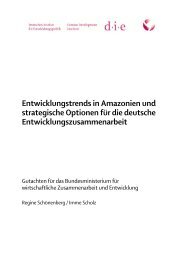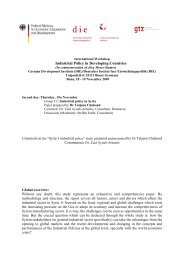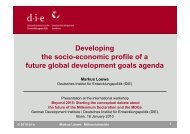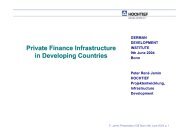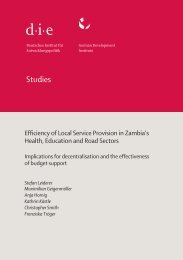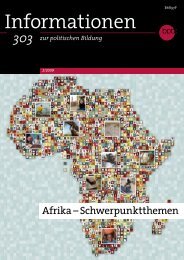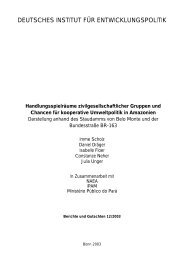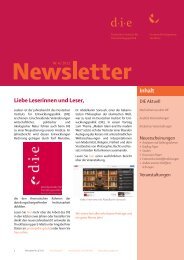Middle East / North Africa and the Millennium Development Goals ...
Middle East / North Africa and the Millennium Development Goals ...
Middle East / North Africa and the Millennium Development Goals ...
Create successful ePaper yourself
Turn your PDF publications into a flip-book with our unique Google optimized e-Paper software.
46<br />
Markus Loewe<br />
in turn results in very low figures indicating that only a very low percentage<br />
of <strong>the</strong> population is living in absolute poverty. The problem here is<br />
that very poor households nei<strong>the</strong>r need gasoline (because <strong>the</strong>y are without<br />
cars) nor purchase heating oil or gas (because <strong>the</strong>y cannot afford to heat<br />
with gas or oil).<br />
In a certain sense, every poverty line is arbitrary. This is illustrated by <strong>the</strong><br />
fact that <strong>the</strong> incomes of many people in <strong>the</strong> MENA region are only slightly<br />
below or slightly above <strong>the</strong> one-dollar-per-day-line, <strong>and</strong> many are slightly<br />
above <strong>the</strong> line in one year <strong>and</strong> below it in <strong>the</strong> next. Replacing <strong>the</strong> onedollar-line<br />
with a two-dollar-line would <strong>the</strong>refore make one little sense. It<br />
would appear more reasonable to use national poverty lines for identifying<br />
poverty trends. These national lines are as a rule based on empirical studies<br />
that indicate what income a national in fact needs to secure his or her<br />
survival over <strong>the</strong> short or long term (Fair 2003; OECD/DAC 1998).<br />
The drawback of national poverty lines is that it is not possible to calculate<br />
average regional data based on <strong>the</strong>m. Fur<strong>the</strong>rmore, while <strong>the</strong>re are data<br />
available for far more countries of <strong>the</strong> region indicating figures for income<br />
poverty based on national criteria ra<strong>the</strong>r than on <strong>the</strong> one-dollar criterion,<br />
this is, unfortunately, not <strong>the</strong> case for all countries of <strong>the</strong> region.<br />
Still, based on <strong>the</strong> data available, we can state that <strong>the</strong> problem of income<br />
poverty has shown an upward trend in <strong>the</strong> region. This is especially true<br />
for Yemen, where national criteria indicate that in 1990 roughly 30 % of<br />
<strong>the</strong> population were living in absolute income-poverty, <strong>and</strong> 42 % in 2000.<br />
But <strong>the</strong> figures for o<strong>the</strong>r countries are also noteworthy: In Algeria <strong>the</strong><br />
share of income-poor by national criteria has risen from 12 % (1987) to<br />
15 % (2000), in Iraq from 30 % (1987) to 45 % (2000), in Morocco from<br />
17 % (1990) to 19 % (2000), <strong>and</strong> in <strong>the</strong> Palestinian Territories from 19 %<br />
(1995) to 46 % (2000). The only countries in which, according to <strong>the</strong> figures<br />
available, <strong>the</strong> share has declined are Egypt (1990: 25 %, 2000: 20 %),<br />
Iran (1990: 26 %, 2000: 21 %), Mauritania (1995: 50 %, 2000: 46 %), <strong>and</strong><br />
Tunisia (1990: 7 %, 2000: 4 %). The data available for <strong>the</strong> o<strong>the</strong>r countries<br />
in <strong>the</strong> region are ei<strong>the</strong>r inadequate or unreliable (see Table A2, Annex).<br />
Figure 1 shows that of all <strong>the</strong> countries, for which we have reliable data,<br />
only Tunisia is making headway towards reaching Target 1 of MDG1. Between<br />
1990 <strong>and</strong> 2000, it was able to cut nearly by half <strong>the</strong> percentage of its<br />
income-poor. Egypt <strong>and</strong> Jordan might also reach Target 1.<br />
German <strong>Development</strong> Institute



